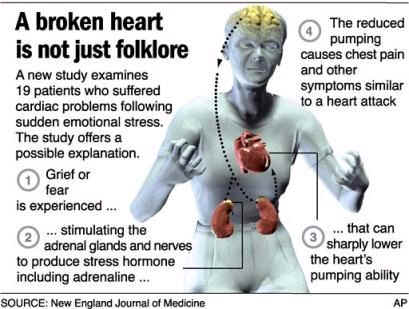Problems Page
I am personally posting this page in the hope it helps others be aware of some of the problems you may face after transplantation.
Although it is not my intention to worry persons I feel obliged to report on such matters of depression, anxiety some recipients may face or like myself dealing with.
Depression after Transplantation
Depression may be a problem after heart transplantation
October 20, 2004
A new study shows that depression among those who've received a new heart is as common as among those with chronic illness.
Depression is known to be a risk factor for poor outcome in heart disease and maybe other chronic conditions. But no-one has looked at the long-term impact of depression in heart transplant recipients. A team at the University Hospital of Leuven, Belgium, now reports on a ten year study of depression in a group of 41 patients who had received a new heart.
They found that 30 per cent had symptoms of depression at five years and 22 per cent at ten years. One in five were depressed at both time points. This is a level of depression higher than among the general population and is similar to that found among those with a chronic illness. They found that a passive coping style and low levels of social and physical activity were linked to a higher risk of depression. None of the depressed patients were actually receiving medication for their condition - maybe because their symptoms were mild, although persistent. The researchers suggest that it's important to monitor heart transplant patients continuously for depression. It may also be that besides antidepressants, patients who are depressed after a heart transplant could be encouraged to take exercise and to socialize more. And they could also be shown how to adopt a more active coping style for managing everyday problems.
Source:
Transplantation International 2004 Volume 17 pages 424-431
Anxiety Attacks
Since my transplant I have been prone to anxiety attacks which in my personal experience have been very frustrating. It has been known that Prednisalone can cause Anxiety and nervousness, though I have been able to control the symptoms such as:
1. Shortness of breath.
2, Chest pain.
3. Fast Heart rate.
4. Irritability.
By using breathing exercises and hypnosis. Below is a study report on anxiety disorders and panic attacks...
Post-Traumatic Stress Disorder (PTSD) is a debilitating condition that follows a terrifying event. Often, people with PTSD have persistent frightening thoughts and memories of their ordeal and feel emotionally numb, especially with people they were once close to. PTSD, once referred to as shell shock or battle fatigue, was first brought to public attention by war veterans, but it can result from any number of traumatic incidents. These include kidnapping, serious accidents such as car or train wrecks, natural disasters such as floods or earthquakes, violent attacks such as a mugging, rape, or torture, or being held captive. The event that triggers it may be something that threatened the person's life or the life of someone close to him or her. Or it could be something witnessed, such as mass destruction after a plane crash.Whatever the source of the problem, some people with PTSD repeatedly relive the trauma in the form of nightmares and disturbing recollections during the day. They may also experience sleep problems, depression, feeling detached or numb, or being easily startled. They may lose interest in things they used to enjoy and have trouble feeling affectionate. They may feel irritable, more aggressive than before, or even violent. Seeing things that remind them of the incident may be very distressing, which could lead them to avoid certain places or situations that bring back those memories. Anniversaries of the event are often very difficult.
PTSD can occur at any age, including childhood. The disorder can be accompanied by depression, substance abuse, or anxiety. Symptoms may be mild or severe--people may become easily irritated or have violent outbursts. In severe cases they may have trouble working or socializing. In general, the symptoms seem to be worse if the event that triggered them was initiated by a person--such as a rape, as opposed to a flood.
Ordinary events can serve as reminders of the trauma and trigger flashbacks or intrusive images. A flashback may make the person lose touch with reality and reenact the event for a period of seconds or hours or, very rarely, days. A person having a flashback, which can come in the form of images, sounds, smells, or feelings, usually believes that the traumatic event is happening all over again.
Not every traumatized person gets full-blown PTSD, or experiences PTSD at all. PTSD is diagnosed only if the symptoms last more than a month. In those who do have PTSD, symptoms usually begin within 3 months of the trauma, and the course of the illness varies. Some people recover within 6 months, others have symptoms that last much longer. In some cases, the condition may be chronic. Occasionally, the illness doesn't show up until years after the traumatic event.
Antidepressants and anxiety-reducing medications can ease the symptoms of depression and sleep problems, and psychotherapy, including cognitive-behavioral therapy, is an integral part of treatment. Being exposed to a reminder of the trauma as part of therapy--such as returning to the scene of a rape--sometimes helps. And, support from family and friends can help speed recovery.
Panic Attacks
People with a panic disorder have feelings of terror that strike suddenly and repeatedly with no warning. They can't predict when an attack will occur, and many develop intense anxiety between episodes, worrying when and where the next one will strike. In between times there is a persistent, lingering worry that another attack could come any minute.When a panic attack strikes, most likely your heart pounds and you may feel sweaty, weak, faint, or dizzy. Your hands may tingle or feel numb, and you might feel flushed or chilled. You may have chest pain or smothering sensations, a sense of unreality, or fear of impending doom or loss of control. You may genuinely believe you're having a heart attack or stroke, losing your mind, or on the verge of death. Attacks can occur any time, even during nondream sleep. While most attacks average a couple of minutes, occasionally they can go on for up to 10 minutes. In rare cases, they may last an hour or more.
Panic Attack Symptoms
-- Pounding heart-- Chest pains
| -- Lightheadedness or dizziness
| -- Nausea or stomach problems
| -- Flushes or chills
| -- Shortness of breath or a feeling of smothering or choking
| -- Tingling or numbness
| -- Shaking or trembling
| -- Feelings of unreality
| -- Terror
| -- A feeling of being out of control or going crazy
| -- Fear of dying
| -- Sweating | |
Panic disorder strikes at least 1.6 percent of the population and is twice as common in women as in men. It can appear at any age--in children or in the elderly--but most often it begins in young adults. Not everyone who experiences panic attacks will develop panic disorder-- for example, many people have one attack but never have another. For those who do have panic disorder, though, it's important to seek treatment. Untreated, the disorder can become very disabling.
Here are 10 steps to help when dealing with Panic Attacks:
- The feelings are normal bodily reactions - exaggerated.
- They are not harmful - just unpleasant.
- Do not add frightening thoughts - negative, unpleasant consequences
- Describe what is happening - notice what IS, not what you fear MIGHT.
- Wait for fear to pass - Do not fight or run away - accept it.
- Notice when it fades - when you stop adding frightening thoughts, it fades by itself.
- It is an opportunity for progress - use it to learn coping - learn to grow!
- Think about progress to date despite the difficulties - think how pleased you'll be when you succeed this time.
- When you begin to feel better, look around you, and start to plan what to do next.
- When you are ready to go on, start off in an easy, relaxed way. There is no need for effort or hurry.
text taken from ANXIETY DISORDERS: DECADE OF THE BRAIN (NIMH).
These are reports on possible conditions though any transplant recipient who suffers from chest pains ect should seek medical advice




